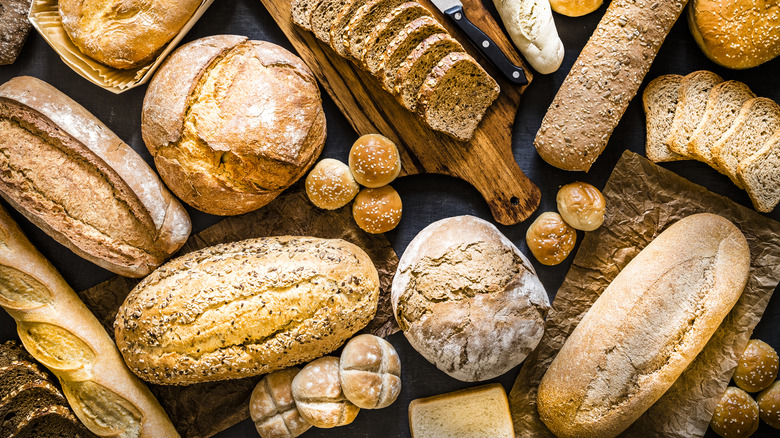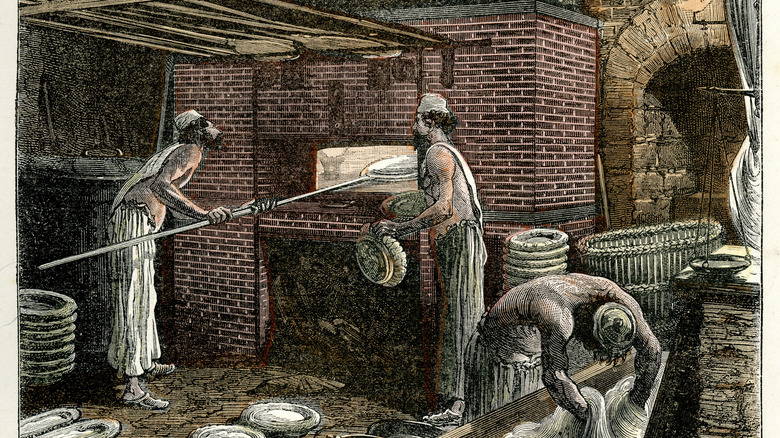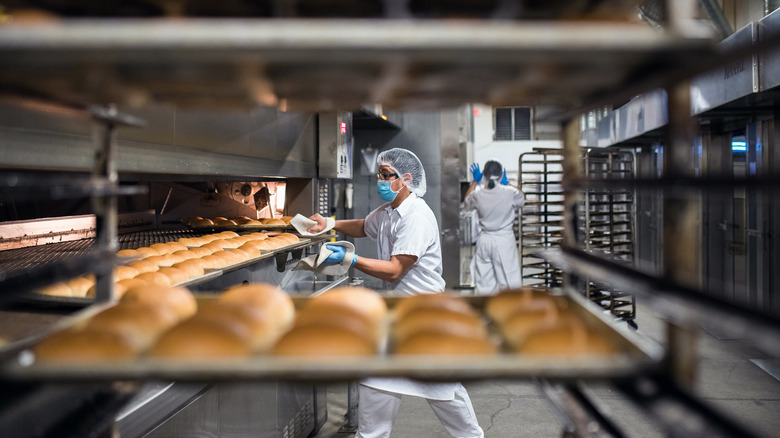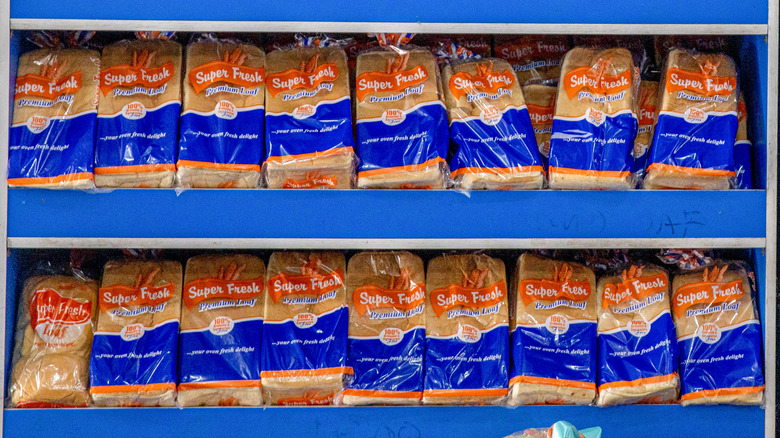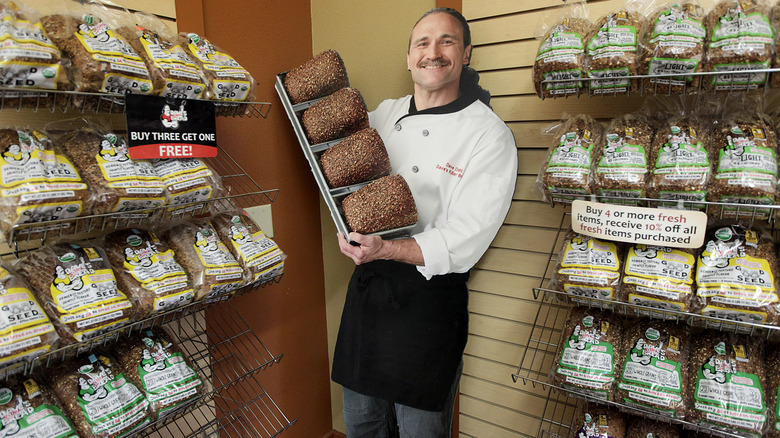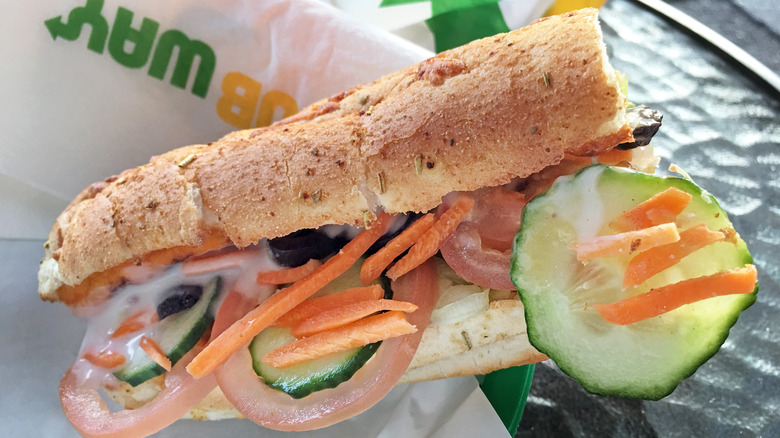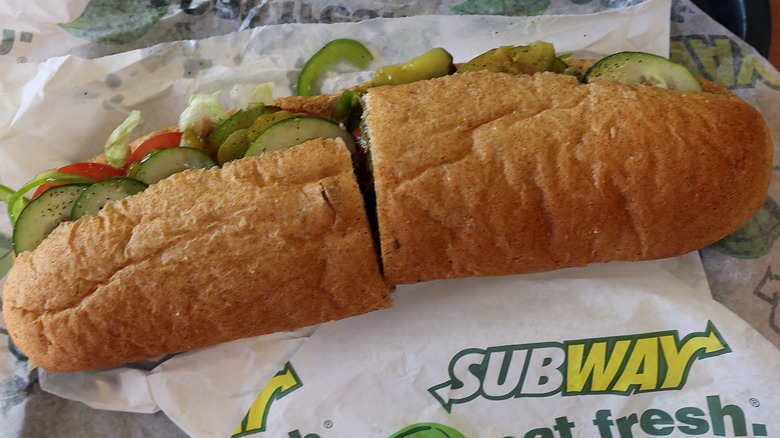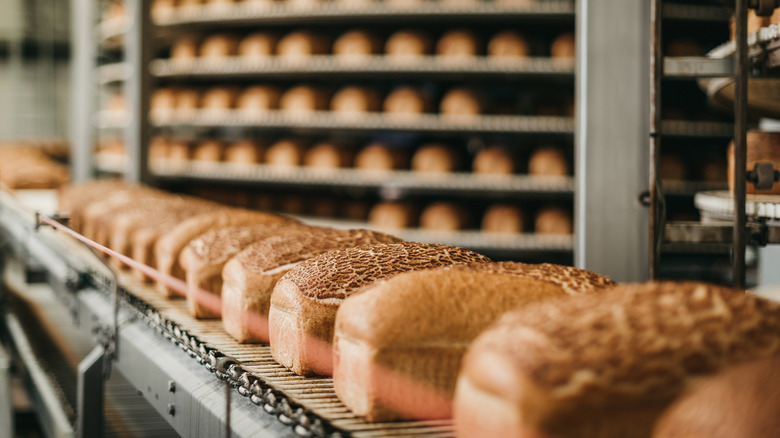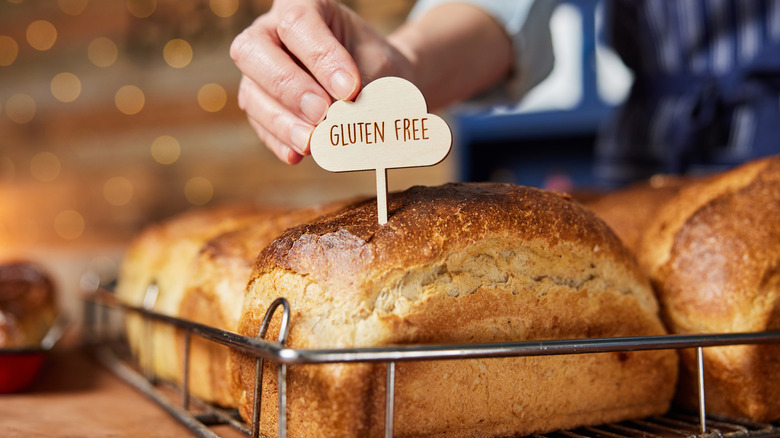Bread Scandals That Shook The Industry
Societies around the world have made different varieties of bread for over 10,000 years. In this time, bread has become a staple for many of these societies and a universal symbol of sustenance and community. Consider, for example, its use in common symbolic language like being the breadwinner and breaking bread. But because of its ubiquity as a low-cost, wholesome meal for the working class, the world's bread industry has experienced countless scandals over the years.
Even in the last few centuries alone, repeated shortages, price spikes, and contaminations of bread have shown that the availability of baked dough is inextricably linked to the health and happiness of the people who consume it. But among the immeasurable number of bread-related atrocities in recent history, a select few stand out as the most heinous offenses against this life-nourishing food. Let's dive into the biggest bread scandals to ever shake the world's baking industry.
High bread prices contributed to the Arab Spring protests
Throughout history, the price of bread has been representative of the health of any given economy. And no writer better describes this relationship than 19th-century anarchist Peter Kropotkin, author of "La Conquête du Pain" (or "The Conquest of Bread"). This book postulates that a successful society relies on its ability to provide sustenance for the masses. So, it is no surprise that protests erupted across the Middle East and Northern Africa when its various governments failed to prevent massive price spikes in 2007.
The Arab Spring protests are the most memorable example of a classic bread riot in recent history. The issue originated when inflation caused by the Egyptian government led bread prices to rise by 37%. In a country where the word for bread, "aish", is the same word for life, this was a potent catalyst that culminated in several armed rebellions across the region (via The Guardian). Over time, these protests evolved beyond the scope of food prices, but bread's importance as a formative issue can't be understated. In fact, it was common to hear, "Bread, freedom, and social justice" during the 2011 Egyptian revolution (via Resistance).
A 19th-century Hong Kong bakery may have committed war crimes
One of the most vitriolic events in the bread industry's history dates back to the Second Opium War, a conflict that emerged between the United Kingdom and China from 1856 to 1860. The conflict caused fierce racial tensions between Chinese and British inhabitants of what was then the British colony of Hong Kong. These tensions culminated in a major food contamination scandal when a Chinese-owned bakery was accused of poisoning several hundred European residents with bread that was laced with arsenic. Thankfully, the poisoner used an improper dose of arsenic, so there were no fatalities, even though the poisoner likely intended to kill the victims (via Armstrong Undergraduate Journal of History).
The blame for this incident was placed on Cheong Ah-lum, the owner of the Esing Bakery that had baked the loaves. Cheong certainly had the motive to sabotage the colonists, but was ultimately acquitted of the crime by the Supreme Court of Hong Kong after a lengthy trial. Since the true perpetrator of this mass poisoning was never determined, it is possible that it was orchestrated by the Chinese government, which would make it a war crime conducted with bread.
Victorian-era bakers frequently added toxic ingredients to their loaves
The malicious behavior of bakers in the Industrial Age of Great Britain establishes a recurring theme in the bread industry: profit-hungry manufacturers never get away with extorting the ever-important loaf. In the early Victorian Era, bread was the staple food of the emergent working class. The average family of six ate about 55 pounds of bread per week, and bakers saw a massive profit potential.
In order to meet the massive demand for bread, Victorian-era bakers began to add extra ingredients like mashed potatoes, plaster of Paris, pipe clay, and sawdust to increase the weight of their loaves. By this time, it had also become common practice to increase the whiteness by adding alum and chalk to the dough. The consumption of these extra ingredients led to many health problems, especially in the case of alum, which was eventually linked to the outbreak of conditions like malnutrition, bowel problems, and rickets. When word spread of this abuse, the British Parliament banned the use of alum and all other additives in bread in 1757 (via the Federation of Bakers). But, of course, this was far from the last time bakers would be caught adulterating their loaves.
Canada's largest grocers were caught in a massive price-fixing scandal
In yet another attempt by corporations to profit excessively off of bread-loving consumers, the Canadian bread industry extorted customers by artificially inflating the price of bread for over a decade. Between 2001 and 2015, many of Canada's major bakers and grocers participated in an industry-wide arrangement by regularly increasing prices on a coordinated basis. The scheme included high-profile grocers like Loblaw, Sobeys, Walmart, Metro, and Giant Tiger.
Consumers are badly hurt by inflated bread prices, as food is the second-largest category in the Consumer Price Index (short of housing). Bread is a worldwide staple, so artificially increasing its cost placed undue stress on all Canadians, especially those below the poverty line. This is why consumers are particularly upset that the Canadian government doesn't have plans to disburse any of the $50 million fine recently paid by Canada Bread to those who purchased the overpriced food (via CBC). If there is any justice to be had, the people will receive some compensation from forthcoming fines as they are levied on the other companies involved in the price fixing.
White bread was weirdly pivotal to racist ideology in America
To put it mildly, white bread has a checkered past. Not only is it controversial for lacking nutritional value, but also for having been used to proliferate racist ideology in the past. At the turn of the 20th century, bread began to be made in a factory using highly refined flour. This resulted in the creation of white bread, which was originally considered to be cleaner due to pre-existing racist beliefs about white skin. These beliefs were exacerbated by the fact that breads made by immigrants were frequently darker, and xenophobic views equated darker bread with dirt and germs. However, these ridiculous notions were eventually dismissed by a revival of the Pure Foods movement, which was oddly also quite racist.
The original Pure Foods movement occurred in the 1800s, and one of its key proponents, Bernarr Macfadden, condemned white bread for lacking moral and dietary fiber. He also condemned it for sapping the vitality of the white race. And when these ideas re-emerged in the 1920s, the racism remained intact. A fresh wave of criticism of white bread emerged in the 1960s, this one finally not motivated by racism (via NPR). Although today's opponents of white bread need not fear this negative association, it will still stain the history of the bread industry as a whole.
Dave from Dave's Killer Bread betrayed his own redemption story
Dave's Killer Bread is a bakery with a beautiful story. Co-founder Dave Dahl was raised by a baker but was troubled by drug abuse in his teen years. Consequently, he ended up in and out of prison for the next 15 years. In the early 2000s, he turned a new leaf and partnered with his brother to develop Dave's Killer Bread based on his family recipe. The company was wildly successful for many years (via NPR), but, unfortunately, Dave went back to jail.
In 2014, Dave had a mental breakdown, which resulted in a police chase where he rammed two cop cars, injuring three. This landed him back in jail (via Statesman Journal). A year earlier, Dave was implicated in the disappearance and death of a friend who was staying at Dave's cabin near Mount Hood (via Willamette Week). Both of these events happened after Dave sold his stake in the company, but it still underlies the fact that the company's image is largely ungenuine.
This is no reason to pass judgment on Dave, as he suffers from addiction and other mental health issues that aren't easily solved. However, his former company's success rests as much on Dave's reputation as it does on his bread. If consumers were aware of Dave's ongoing issues with the law and how he is no longer the owner of the company, Dave's Killer Bread could see an end to its explosive growth.
Subway's bread came under fire for including a chemical used to make yoga mats
Because bread is made from simple ingredients, its recipe is highly conducive to industrial processing. No company knows this better than Subway, which drew criticism from customers because of its use of a chemical called Azodicarbonamide (ADA) in its bread production. As explained in our coverage of the story, ADA has been historically used to bleach bread and improve its durability, despite the fact that it has been linked to increased cancer rates in humans. And yes, the chemical is also used to make yoga mats and shoe rubber (via Bill of Health).
Credit goes to food blogger Vani Hari, also known as Food Babe, for alerting the public to the presence of this harmful chemical in Subway's bread. In 2014, Vani circulated a petition to cease the use of this ingredient that earned over 100,000 signatures and gained the attention of the company. It also noted that ADA was only being used in the North American recipe for the bread since it is illegal in most other parts of the world.
Subway's bread was ruled to be not technically bread
In yet another example of Subway processing its sandwich bread beyond reasonable limits, Ireland's Supreme Court ruled that the company had modified its bread recipe so much that the product failed to meet the definition of bread per Ireland's Supreme Court. This ruling came about in 2020 when one Subway franchisee challenged the court that their bread should be tax-exempt like other staple foods. However, authorities determined that Subway's bread should technically be categorized as a confection because it contains more than five times the standard amount of sugar that bread should contain (via NPR).
This news was a blow to Subway's reputation, as the company has been criticized in the past for inaccurately characterizing its food as healthy. The nutrition from meals one gets at Subway isn't too far off from the nutrition one gets from a meal at McDonald's. The average meal at Subway contains 36 grams of sugar compared to 54 grams at McDonald's. The average meal at Subway contains 2,149 milligrams of sodium compared to 1,829 milligrams at McDonald's. Other macronutrient averages are equally concerning. If you're looking for quality bread, you can do better than Subway.
Some processed bread may contain a protein derived from human hair
Unsurprisingly, Subway isn't the only commercial bread manufacturer that has been criticized for using unnatural ingredients. In fact, most grocery store bread brands could feasibly contain traces of human hair, duck feathers, cow horns, or pig bristles. These ingredients are natural sources of L-cysteine, an amino acid that was revealed in 2016 to be a common additive to processed bread. The chemical is meant to prolong the shelf-life of mass-produced bread and isn't otherwise found in fresh-baked bread (via NY Post).
This isn't shock journalism, either. Researchers at The Vegetarian Resource Group Blog confirmed via an official statement from a major Chinese supplier that human hair is indeed a primary source of synthesized L-cysteine. This was corroborated by a second source. While processed foods have their role in keeping the widely dispersed world population fed, some industrial processes change the food in a way that isn't consumer-friendly. L-cysteine may not be dangerous to consume, but it is certainly an ingredient most consumers would prefer to go without if they were aware of it.
Manufacturers issued a recall when customers found broken glass in their packaging
The American bread industry was briefly rocked by a surprisingly salacious recall in 2015 when fragments of a broken light bulb were found to have contaminated multiple batches of bread produced in one commercial bakery. Thankfully, the glass was found on the outside of the bread rather than the inside, so it was easily identified by consumers before anybody injured themselves eating it. Still, the issue made national news because of both the sensational headline and the sheer number of companies affected. These included Sara Lee products, Nature's Harvest, Bimbo brands, Kroger, Great Value brands, and L'Oven Fresh. The recall affected several US states including Alabama, Florida, Georgia, Kentucky, Mississippi, North Carolina, Ohio, South Carolina, Tennessee, Virginia, and West Virginia (via USA Today).
Every time a story like this emerges, it serves as a reminder to the bread-consuming public that all these processed brands are made in the same factory. It also reminds consumers that baked products are more products than baked goods. Just remember, you never hear about finding broken glass atop a fresh-baked loaf of bread.
Bread makers exacerbated the gluten-free hysteria
Although bread has found itself at the center of many nutrition-based arguments, few have fomented quite as much hysteria as the gluten-free trend. Gluten-free products used to only appeal to consumers with celiac disease, which is similar to a severe gluten allergy. However, gluten-free quickly evolved into a fad diet based on misinformation about a hotly debated condition called gluten sensitivity. Many gastroenterologists don't consider this a real condition despite many anecdotal reports from individuals who suffered less indigestion and intestinal bloating after switching to a gluten-free diet (via Columbia Doctors).
The debate seems relatively benign on the surface, but some dieticians assert that voluntarily opting for a gluten-free diet poses multiple health risks. This is because gluten-free diets may leave you with dangerously low levels of iron, calcium, fiber, and folate in your diet (via Mayo Clinic). Additionally, avoiding glutenous foods means that you may not be able to catch a developing case of celiac disease, which could be life-threatening if left undiagnosed. The role of the bread industry in all of this isn't particularly insidious, though. At worst, major bread producers fueled the gluten-free hysteria by meeting the growing demand with ample supply. At best, they were simply responding to new trends in the grain market.
